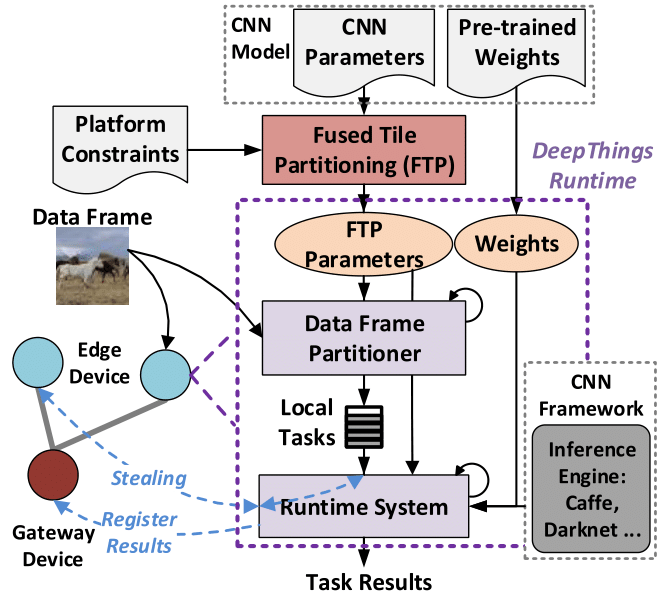https://github.com/zoranzhao/deepthings
A Portable C Library for Distributed CNN Inference on IoT Edge Clusters
https://github.com/zoranzhao/deepthings
deep-neural-networks distributed-deep-learning edge-computing internet-of-things iot-edge-clusters
Last synced: 3 months ago
JSON representation
A Portable C Library for Distributed CNN Inference on IoT Edge Clusters
- Host: GitHub
- URL: https://github.com/zoranzhao/deepthings
- Owner: zoranzhao
- License: mit
- Created: 2018-06-26T01:00:31.000Z (over 7 years ago)
- Default Branch: master
- Last Pushed: 2020-03-18T07:20:50.000Z (almost 6 years ago)
- Last Synced: 2023-10-21T00:07:07.344Z (about 2 years ago)
- Topics: deep-neural-networks, distributed-deep-learning, edge-computing, internet-of-things, iot-edge-clusters
- Language: C
- Homepage:
- Size: 1.81 MB
- Stars: 73
- Watchers: 4
- Forks: 41
- Open Issues: 7
-
Metadata Files:
- Readme: README.md
- License: LICENSE
Awesome Lists containing this project
README
# DeepThings
DeepThings is a framework for locally distributed and adaptive CNN inference in resource-constrained IoT edge clusters. DeepThings mainly consists of:
- A Fused Tile Partitioning (FTP) method for dividing convolutional layers into independently distributable tasks. FTP fuses layers and partitions them vertically
in a grid fashion, which largely reduces communication and task migration overhead.
- A distributed work stealing runtime system for IoT clusters to adaptively distribute FTP partitions in dynamic application scenarios.
For more details of DeepThings, please refer to [1].

Overview of the DeepThings framework.
This repository includes a lightweight, self-contained and portable C implementation of DeepThings. It uses a [NNPACK](https://github.com/digitalbrain79/NNPACK-darknet)-accelerated [Darknet](https://github.com/zoranzhao/darknet-nnpack) as the default inference engine. More information on porting DeepThings with different inference frameworks and platforms can be found below.
## Platforms
The current implementation has been tested on [Raspberry Pi 3 Model B](https://www.raspberrypi.org/products/raspberry-pi-3-model-b/) running [Raspbian](https://www.raspberrypi.org/downloads/raspbian/).
## Building
Edit the configuration file [include/configure.h](https://github.com/zoranzhao/DeepThings/blob/master/include/configure.h) according to your IoT cluster parameters, then run:
```bash
make clean_all
make
```
This will automatically compile all related libraries and generate the DeepThings executable. If you want to run DeepThings on Raspberry Pi with NNPACK acceleration, you need first follow install [NNPACK](https://github.com/zoranzhao/darknet-nnpack/blob/2f2da6bd46b9bbfcd283e0556072f18581392f08/README.md) before running the Makefile commands, and set the options in Makefile as below:
```
NNPACK=1
ARM_NEON=1
```
## Downloading pre-trained CNN models and input data
In order to perform distributed inference, you need to download pre-trained CNN models and put it in [./models](https://github.com/zoranzhao/DeepThings/tree/master/models) folder.
Current implementation is tested with YOLOv2, which can be downloaded from [YOLOv2 model](https://github.com/zoranzhao/DeepThings/blob/master/models/yolo.cfg) and [YOLOv2 weights](https://pjreddie.com/media/files/yolo.weights). If the link doesn't work, you can also find the weights [here](https://utexas.box.com/s/ax7f0j0qwnc4yb9ghjprjd93qwk3t4uw).
For input data, images need to be numbered (starting from 0) and renamed as <#>.jpg, and placed in [./data/input](https://github.com/zoranzhao/DeepThings/tree/master/data/input) folder.
## Running in a IoT cluster
An overview of DeepThings command line options is listed below:
```bash
#./deepthings -mode
# -total_edge
# -edge_id
# -n
# -m
# -l
```
For example, assuming you have a host machine H, gateway device G, and two edge devices E0 (data source) and E1 (idle), while
you want to perform a 5x5 FTP with 16 fused layers, then you need to follow the steps below:
In gateway device G:
```bash
./deepthings -mode gateway -total_edge 2 -n 5 -m 5 -l 16
```
In edge device E0:
```bash
./deepthings -mode data_src -edge_id 0 -n 5 -m 5 -l 16
```
In edge device E1:
```bash
./deepthings -mode non_data_src -edge_id 1 -n 5 -m 5 -l 16
```
Now all the devices will wait for a trigger signal to start. You can simply do that in your host machine H:
```bash
./deepthings -mode start
```
## Running in a single device
Many people want to first try the FTP-partitioned inference in a single device. Now you can find a single-device execution example in [./examples](https://github.com/zoranzhao/DeepThings/tree/master/examples) folder. To run it:
```bash
make clean_all
make
make test
```
This will first initialize a gateway context and a client context in different local threads. FTP partition inference results will be transferred between queues associated with each context to emulate the inter-device communication.
## Porting DeepThings
One just needs to simply modify the corresponding abstraction layer files to port DeepThings.
If you want to use a different CNN inference engine, modify:
- [src/inference_engine_helper.c](https://github.com/zoranzhao/DeepThings/blob/master/src/inference_engine_helper.c)
- [src/inference_engine_helper.h](https://github.com/zoranzhao/DeepThings/blob/master/src/inference_engine_helper.h)
If you want to port DeepThings onto a different OS (Currently using UNIX pthread), modify:
- [distriot/src/thread_util.c](https://github.com/zoranzhao/DeepThings/blob/master/distriot/src/thread_util.c)
- [distriot/src/thread_util.h](https://github.com/zoranzhao/DeepThings/blob/master/distriot/src/thread_util.h)
If you want to use DeepThings with different networking APIs (Currently using UNIX socket), modify:
- [distriot/src/network_util.c](https://github.com/zoranzhao/DeepThings/blob/master/distriot/src/network_util.c)
- [distriot/src/network_util.h](https://github.com/zoranzhao/DeepThings/blob/master/distriot/src/network_util.h)
## References:
[1] Z. Zhao, K. Mirzazad and A. Gerstlauer, "[DeepThings: Distributed Adaptive Deep Learning Inference on Resource-Constrained IoT Edge Clusters](https://zoranzhao.github.io/docs/deepthings_2018.pdf)," CODES+ISSS 2018, special issue of IEEE Transactions on
Computer-Aided Design of Integrated Circuits and Systems (TCAD).
## Contact:
Zhuoran Zhao,